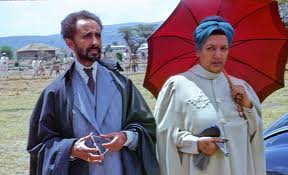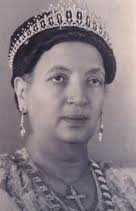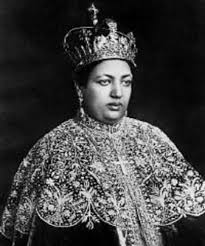
By Mel Cooke—
Saturday, November 2, marked 83 years since His Imperial Majesty Emperor Haile Selassie and Her Imperial Majesty Empress Menen were crowned at the Cathedral of St George in the capital of Ethiopia, Addis Abbaba.
While the overwhelming focus of observances of the date which is especially significant to the Rastafarian movement is on Haile Selassie, Empress Menen gets her due in songs.
Singer Tarrus Riley’s She’s Royal is well known as a tribute to the inner and outer beauty of women. Among the standout lines are “What a natural beauty/No need no make-up to be a cutie/She’s a queen”.
However, referring to a regal woman by official title, Riley tips a lock at HIM Haile Selassie’s move to make the equality between himself and his mate clear:
Yes I an I
I know the King and Queen crown same time
So I will never leave your side
Not saying Empress Menen’s name outright, although the reference with the dual coronation within a Rastafari context is clear, makes the scope of those who can be considered regal wider.
Warrior King’s view
Similarly, although he does not openly state a critique of the Christian Trinity of Father, Son and Holy Spirit in Virtuous Woman, Warrior King affirms the inclusion and equality of the woman in Rastafari’s Royalty:
Give ises to the King
And his Empress Menen
Who showed us the right and true way of living
Woman could never cause sin
He goes on to affirm:
Equality inna Zion
By nature’s law that’s the way it should go
In a previous interview with The Sunday Gleaner, Warrior King said the line underscores his belief that “the man is the man in the relationship, but you have to respect the woman”.
Ironically Mutabaruka’s Great Queens of Africa (which features the voices of Sharon Forrester and Ini Kamoze) does not refer to the coronation of Empress Mennen. However, he goes further back in time than the November 2, 1930, dual coronation.
Still, he includes Haile Selassie’s matriarchal lineage, thereby emphasising the importance of woman in another way:
Talkin’ ’bout Makeda, Queen of Sheba
Ruled from Arabia to Ethiopia
Fell in love with Solomon
Brought forth Selassie forefather
Menelik I
And the central message is:
Great queens of Afrika
Rulers all around
They were mighty brave and strong
Europeans couldn’t get them down
As is his wont, the Informative History Man goes into extensive detail about Empress Menen in his track of the same name. He states her year of birth, 1890, the date of her wedding to Haile Selassie (July 31, 1911). And, of course, History Man speaks to the coronation:
1930 she wear the crown of Empress
She is the highest, the best, the greatest goddess
The circumstances of Haile Selassie’s death on August 27, 1975, at 83 years old remain obscure. He was predeceased by Empress Menen, who died in 1962.
melville.cooke@gleanerjm.com













